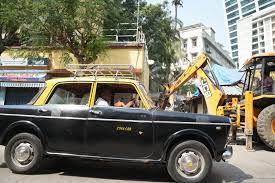“End of an Era: Mumbai’s Iconic ‘Kaali Peeli’ Taxis Retire After 6 Decades”
Mumbai bids farewell to its beloved ‘Premier Padmini’ taxis, fondly known as ‘kaali-peeli,’ as they retire from the city’s streets after decades of service, making way for newer models and app-based cab services.


The iconic ‘Premier Padmini’ taxis, affectionately referred to as ‘kaali-peeli,’ have been an integral part of Mumbai’s cultural and transportation landscape for over six decades. However, these black-and-yellow taxis will now take their final bow and bid adieu to the bustling streets of Mumbai. This significant transition marks the end of an era, as these legendary taxis make way for newer vehicle models and app-based cab services, following the recent retirement of Mumbai’s iconic red double-decker diesel buses operated by the Brihanmumbai Electric Supply and Transport (BEST) undertaking.
A transport department official revealed that the last Premier Padmini taxi, a symbol of Mumbai’s identity, was officially registered at the Tardeo Regional Transport Office (RTO) on October 29, 2003. Since the age limit for taxis in Mumbai is set at 20 years, the city will no longer have a Premier Padmini taxi in operation starting Monday.
For decades, these black-and-yellow taxis have been more than just a mode of transportation in Mumbai; they have been an intrinsic part of the city’s identity and culture. Residents and visitors alike have shared countless journeys and memories within the cozy confines of these timeless cabs.
Abdul Kareem Karsekar, a resident of Prabhadevi, owns the last registered Premier Padmini taxi in Mumbai, bearing the distinctive registration number MH-01-JA-2556. “Yeh Mumbai ki shaan hai aur hamari jaan hai” (it is the pride of Mumbai and life of mine), Karsekar passionately expressed, highlighting the deep connection that these iconic taxis hold in the hearts of Mumbai’s people.
The retirement of both the legendary red double-decker diesel buses and the ‘kaali-peeli’ taxis within a few weeks has left transportation enthusiasts in Mumbai feeling nostalgic and sentimental. Some have called for preserving at least one Premier Padmini as a living monument on the road or in a museum, recognizing their historical significance.
Classic car enthusiast Daniel Sequeira emphasized the need to preserve these iconic cabs, describing them as “living monuments.” He stressed their role in Mumbai’s history, spanning over five decades and creating a sentimental connection for multiple generations.
Despite previous efforts by the Mumbai Taximen’s Union, one of the city’s largest taxi driver unions, to petition the government to preserve at least one ‘kaali-peeli,’ no successful preservation initiatives have been realized.
The legacy of Premier Padmini taxis goes beyond transportation; they have made appearances in numerous Bollywood films, including titles like ‘Taxi No. 9211,’ ‘Khaali-Peeli,’ and ‘Aa Ab Laut Chale.’ These taxis, along with the iconic red double-decker buses, have often been featured in the opening sequences of old Bollywood movies, serving as symbols of Mumbai’s vibrant and dynamic character.
Mumbai’s love affair with the ‘kaali-peeli’ taxis has been long-standing, and their retirement signifies the end of an era. As the city continues to evolve, embracing modern transportation options, the memory of these timeless taxis remains etched in the collective imagination of Mumbai’s people.
Mumbai’s streets will now see over 40,000 black-and-yellow taxis in operation, a significant reduction from the approximately 63,000 such taxis that roamed the city in the late ’90s. These classic taxis have played a vital role in the city’s transportation history.
AL Quadros, the general secretary of the Mumbai Taximens Union, shared insights into the legacy of the Premier Padmini taxis. He noted that their journey as taxis began in 1964 with the ‘Fiat-1100 Delight’ model, a powerful 1200-cc car featuring a steering-mounted gear shifter. In the ’70s, the model underwent rebranding, becoming “Premier President” and eventually “Premier Padmini,” named after the legendary Indian queen Padmini. This model continued to be a steadfast presence on Mumbai’s roads until its production ceased in 2001.
At one point, around 100-125 Premier Padmini taxis remained unregistered due to a lack of spare parts and other issues following the cessation of production. However, in 2003, car dealers successfully secured their registration. The last of these iconic taxis registered in 2003 has now reached the end of its journey and will be retired.
The popularity of Premier Padmini taxis in the ’90s can be attributed to their smaller size, reliable engines, ease of maintenance, and comfortable interiors. However, with the discontinuation of spare parts and the Maharashtra government’s imposition of a 25-year age limit for taxis in 2008 (later reduced to 20 years in 2013), many Premier Padminis left the roads, making way for newer hatchback models from Maruti Suzuki and Hyundai.
While these iconic taxis will no longer traverse Mumbai’s streets, their presence in the city’s history and culture is indelible. They have played a crucial role in shaping the identity and character of Mumbai, representing more than just a mode of transport. As they retire from the city’s streets, they leave behind a rich legacy of memories and experiences shared by countless passengers and drivers.
Sources By Agencies




